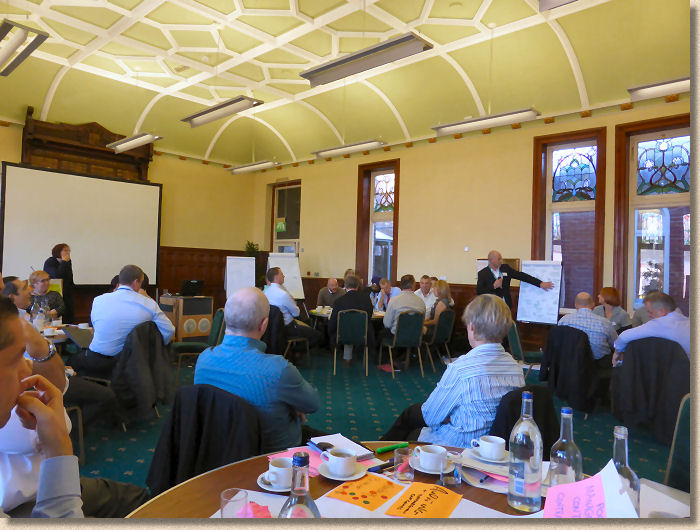H&S Level Playing Field
As part of the on-going HSE-sponsored project to reduce ill-health in the paving and roadworks trades, a special one day workshop was organised to, in the words of the HSE, " explore why there is not a level playing field for the management of health risks when tendering for construction projects " and what can be done about the future management of those risks.
As usual with this sort of event, the description does little to describe the issue at hand, so to translate into the sort of everyday language used on building sites and roadwork projects, how is it some buggers get away with little or no H&S while some of us have to wear full PPE just to go to the bog? Why isn't there one set of standards for H&S throughout our industry?

As usual with this sort of event, the description does little to describe the issue at hand, so to translate into the sort of everyday language used on building sites and roadwork projects, how is it some buggers get away with little or no H&S while some of us have to wear full PPE just to go to the bog? Why isn't there one set of standards for H&S throughout our industry?
Prior to the workshop, the HSE team identified five topics they thought to be of greatest concern, and these are:
- Continued use of subbies known to have poor H&S standards
- Inability of the clients to properly monitor and enforce H&S
- Tendency for subbies to buy 'off-the-shelf' H&S and RA packages
- Clients failure to prioritise Occupational Health as an issue
- Sheer inconsistency between clients regarding just what they expect
During the morning session, the various groups expanded on the issues facing the industry, and came up with a shortlist of:
- Lack of training
- Focus on Safety rather than Health
- Huge variation in standards
- Cost and resource limitations
- Inadequate monitoring/supervision/management
- Failure to appreciate risks to health
Standards and enforcement
Needs to be politically driven and funded via government, and then properly enforced once enacted.
Prosecute offenders was a common cry.
Monitoring
The use of a 'Fit To Work' card which keeps track of operatives' health regardless of employer of self-employed status. This was considered a possible method of tracking health across what is a largely transient workforce.
Risk Perception
The failure to understand and appreciate risk runs right through the industry, from clients, through designers, down to contractors and operatives. The only fix for this is education. The long latency of health issues is a major contributor to the lack of understanding. Cut off a finger with a power saw and it's an immediate response, but when it can take 20 years or more to develop lung problems from dust, or arthritis from kneeling in damp sand, and no-one seems to take responsibility.
And the widespread use of generic, off-the-shelf, one-size-fits-all risk assessments is actually working against the desire to improve health and, indeed, safety.
Health vs Safety
This theme was repeated again and again. Health seems to take a back seat in thinking about our trade, so we need to raise awareness via life-long learning. The HSE itself needs to provide better advice, despite the so-called 'austerity cut-backs' and the NHS should contribute because it's more cost effective to prevent someone developing a long term illness rather than nurse them through it.
But over and above this, there is a need to make operatives and everyone else in the industry more full appreciate the benefits of proper health and safety management. This makes for a workforce with a longer service life and enables operatives to reach retirement, not only in one piece, but also in a state of health which allows them to fully enjoy their retirement.

As always with these events, there's a good deal of hot air and vague promises, but at least it is a step in the right direction. It doesn't help when you have numpties who genuinely believe that 90% of the paving and roadwork operatives are 'employed' in one place, by a single life-long employer, and won't accept that our trade is transient, that we do have huge numbers of self-employed who traipse from job to job, contractor to contractor, region to region looking for work, and so keeping track of their health is a massive challenge, but this is only to be expected from those that drive nothing bigger than a keyboard and have only a 50% chance of holding a spade the right way around.
However, it is part of an ongoing push from HSE to improve the pretty horrific record we have in the paving and roadworks industry. Every single week, two men (and it is usually men) die as a direct result of exposure to dangerous dust at their work, and then there's the countless numbers lost from the trade because their backs or knees have packed up on them, or their hearing is knackered, or their grip weakens due to vibration. We can't afford to lose all this experience, and it just isn't right that we expect our workforce to tolerate such indignities.
You can read more about what's being done in your name, and you can actively contribute to the debate and the ongoing work by joining the web community for this whole project at….
http://webcommunities.hse.gov.uk/connect.ti/kerbcutting.community
Whether you are a labourer, a tradesman, ganger, contractor, designer, client or just someone with an interest in promoting H&S in the paving trade, your thoughts and ideas are most welcome.

